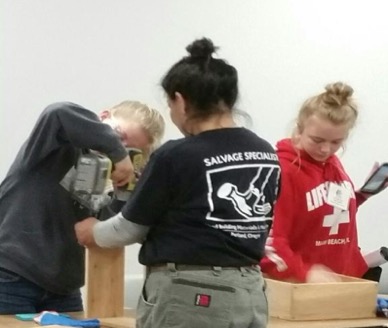By: Melissa Bockwinkel, Ella Rose Kelly, Becca Schultz & Mayela Alvarado
Tell us about the event you just attended:
Becca Schultz (BS): We attended the Oregon Tradeswomen Career Fair on Girls Day. 1,700 middle school and high school girls throughout Oregon participated. It is one of the largest hands-on career fairs in the nation. It gives girls the chance to experience construction trades in a women-led environment, which is not always how women are introduced to the trade. Girls have the opportunity to do everything from fixing a leaky water main to climbing telephone poles (spike shoes included!), riding in bucket trucks, shooting a firehouse, building things like bird houses, planter boxes, wiring a light, practicing welding and pipe bending, using propane torches, and laying down roofing. In addition to the hands-on work, they get a chance to talk to women who work in this field every day, women who could be seen as mentors to those interested in the trades. Starting to network and build relationships with professionals in the field is also an important element. Portland Women in Building!
Ella Rose Kelly (ERK): This year we concentrated on planter boxes. We had four different groups of 18-20 in size come through our area, and focused on middle school and high school age groups. Our goal was having the girls be able to handle power tools, work together as a team, and help each other out as planter boxes were finished—with no injuries!
Mayela Alvarado (MA): It is always an honor to represent the ReBuilding Center. It is fun and exciting to share who we are to a group of young women who may not have known about the ReBuilding Center or the reuse industry, and how to create something of value out of raw materials. It was lovely expressing the importance of the skills in reuse, such as safety and communication, and putting these skills into practice when the groups created their planter boxes. It was great to have the tools available for them and the pre-cut material—thanks to all who helped prep the materials! We encouraged them to work together as teams and everyone had fun on their projects. We have been doing this since the beginning (six years!) and it is always fun how we all pull together to make it a great experience for the participants. We are planting the seeds with these girls to whatever may come in their futures. In the end, they were able to create such beautiful projects.
What was one highlight from the day that stood out to you?
ERK: One girl with short-blond hair and Carhartts—she was frustrated to start, and just the joy on her face when she finished made my day that she had something to take home and plant her tomatoes in.
BS: This year I volunteered as a VIP Tour Guide. I got to chat with women from DHS in Central Oregon, working with women in the tribes, those formerly incarcerated, and those who are sole providers of their family. We talked about how to get women into the construction trades to make a living wage. Construction provides not only living wage but prevailing wage jobs, while at the same time not incurring any student debt.
A second highlight of the day was just being there seeing 1,700 girls be exposed to the trades, seeing their faces light up when they experienced any one of the activities, and igniting the sense of opportunity. They can do this kind of thing too and also may do it better.
MA: One of the teachers was regretting that she had not heard about us in order to make room for her students. I asked her to stop back at the end and we were able to provide her with some of the extra materials we had left over from the other groups so she could take it back to her classroom and complete the planter boxes later.
Why is the ReBuilding Center’s partnership with Oregon Tradeswomen important?
ERK: We empower and encourage. We don’t just value existing materials—we value our community resources as well. It’s important to teach the youth about their futures, to not waste things and fill the landfill but, rather, to be more aware of how materials can be reused.
MA: Giving the girls insight into reuse possibilities, along with hands-on exposure using hand tools to create a useful project with the help of each other.
As more women get involved in the trades, how do you think the trades will change?
BS: We can bring a different skillset and thought process to the trades that historically hasn’t been there. It makes more job sites equitable for everyone, and more accepting and welcoming to diversity in the workplace. I also think it will bring more compassion to the workplace. Women can be really good at building teams, and as more women enter the trades, we can expect to see more women as supervisors and more equitable building practices. We can build more of a connection to “place,” and people may be more tied to the communities they are in. There is also the chance to bring a different approach to problem solving.
ERK: I think the trades will become more non-traditional. We are challenging the stereotype that women should stay in the home by having more women present out in the trade fields, climbing ladders, and as electricians.





